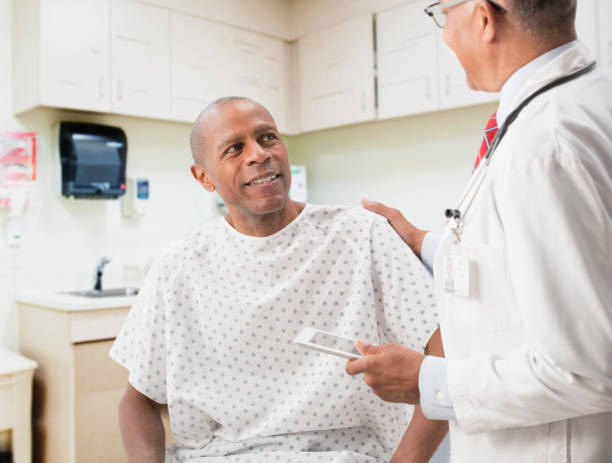(ThyBlackMan.com) Exercising regularly is an essential element of self-care for black men. Taking care of your body, both inside and out, will help you look and feel your best. If you aren’t used to regular exercise, start slowly by getting into good habits. Try doing a light walk or run every day or every other day. Take a tip from a middle-aged runner who has had a successful health regimen since high school, or so I thought!
I had an unfortunate run-in with a condition known as “diverticulitis” to the medical community. It started a week before Christmas. I am a man who believes a commitment to life in the small parts translates to victory in the larger arena. I have been fortunate to win the attendance award at my job for three years straight. Not because of my great work ethic but because I believe it is important to set a good example for those inclined to leadership, no matter what your profession, as a writer and freelance journalist. I believe it is summed up in a book I wrote a few years back, “Role Model by Default.” This writer has also been the author of and defended a successful Doctoral thesis titled: The Infant Mortality Rate and the Black Community. This is the part of my story where I tell my readers in the words of Langston Hughes; Life for me Aint Been no Crystal Stair!
On Monday of a new week, I finally called in sick because I coughed with a slight reverb and one of the children at the school where I work yelled out fictitiously, “Uh-oh, Covid!” Some people seem to think that protection from illness begins and ends with the other person. When I returned to work on Tuesday, I was greeted with some good-natured teasing about missing work at such a vital time of the year. At Morning Huddle, we always open the day with basically words of encouragement to start the day on a positive note. One colleague even quoted a scripture from the Bible (Genesis 2: 3), “On the seventh day God rested, and on Monday so did Mr. B,” as I am called by my colleagues; “we wish him well,” he concluded. How thoughtful and inspiring it was to be singled out for such a mundane occurrence, I thought, yet I was very appreciative of the gesture of kindness and appreciation.
I took some over the counter cold medicine and continued my duties with no major issues for the next 3 days, however on Thursday night something did not feel just right to me where my body is concerned. My first thought was that this was the lingering effect of what I thought was a cold. I sat down with the desire to have a bowel movement to alleviate the uncomfortable feeling in my gut; however, unbeknownst to me, I was in for the shock of my life!
Something seemed strange about this washroom visit; I could feel diarrhea yet, how could this be? I didn’t feel that bad at the time and was content that in this moment the worst was over, not so! I stood up to flush and noticed plum-colored blood in the toilet. This can’t be good, I thought. It was now about 10:30 a.m. I washed up a bit and headed for the nearest hospital’s Emergency Room Intake to help me figure this out. Was I about to die? Was this a sign from God to slow down?

I noticed that the waiting room at the hospital’s emergency room was almost full, yet only one person was ahead of me on the intake list, where they ask you in a nice way, “What brings you here to the ER, sir?” I said, with the best of my ability and in as few words as possible, “I am having problems eliminating waste!” Without thinking, she pulled a label from her computer, attached it to my arm, and said, “Have a seat in the waiting room and listen for your name!” Once I was sure things were under control, a person from patient services took my blood pressure and temperature. I asked if there was a washroom close, and she said, “About 40 feet to the left, right next to room 1.” I made it almost to the toilet, and the next thing I realized was that this felt like another diarrheal moment. Not quite, but the blood in the stool appeared to be an ominous sign. The yell I made for help summoned four healthcare workers, all female. I knew pride was kicking in, but I realized something was wrong with me, and I was there to get better with the advice of the medical professionals in this hospital. The four staff members retrieved a wheelchair and assisted me with pulling up my pants, flushing the toilet, which was again saturated with blood, and getting me back to the original intake room. I was woozy and somewhat incoherent due to the sudden loss of blood, however, I figured; might as well try my sense of humor if I am as close to death as I felt. I looked slowly around the room, again noticing the four healthcare professionals with their eyes fixed on me as if this were a training session, and said: “Ladies, I had a dream once that I was shipwrecked on a desert island, and four beautiful women came and rescued me while catering to my every beck and call. I did not think that dream would come true in a hospital.” Now as sick as I felt and as professional as my four audience members appeared on the surface, they all responded with a hearty laugh!
Later, they hooked me up to an IV and started to monitor my vital signs. My pastor called and said a prayer…I knew something positive was about to happen when I hung up the phone! Thank God! Thinking back, I had never spent a night in a hospital before, and the attendance award was just a distant memory now. Still that one day I would always remember and tell others of my experience with a view to preventative medicine.
The attending doctor returned and told me I had the flu, which was not helping with the second diagnosis of diverticulosis, a rupture at the base of the colon right next to an artery. I had lost a pint of blood in each of my last two washroom visits as a result. A CT scan and an angiogram that evening revealed that, while I was not out of the woods, the worst was over. The bleeding had stopped almost as quickly as it had started, and there were no other complications, except for the flu, which now seemed like the least of my concerns. In a nutshell, I was given some medication and told to watch my diet moving forward and to supplement that diet with iron while my blood hemoglobin level returns to normal levels naturally over a period of time. I will list here some commonsense approaches from medical professionals that deal with the condition called diverticulosis:
Diverticulitis
Diverticulitis is a condition that occurs in the large intestine (colon). Inflammation or infection that affects the pouches that form in the intestine is referred to as diverticulitis. While diverticula simply refer to the formed pouches, and the presence of the pouch does not necessarily signify harm to the body system. The presence is called diverticulosis, while the inflammation described above is called diverticulitis (1).
Diverticulitis might at times be mild. However, it can also be serious, resulting in severe infection or intestinal perforation (your doctor will refer to this as a rupture). Adults frequently have Diverticular Disease, but diverticula can sometimes be present at birth in infants. Meckel’s diverticulum is the term used when this occurs. Meckel’s diverticulitis is the medical term for an inflamed diverticulum (2).
Epidemiology
Acute diverticulitis is the most often mentioned gastrointestinal disease in outpatient clinics and the emergency room, and it is the third most prevalent gastrointestinal inpatient diagnosis in the United States, with an annual cost of $2.1 billion.
Diverticulosis prevalence has been reported to increase with age, increasing from less than 20% at age 40 to 60% by age 60. Over the past few decades, diverticulitis has become more common; it now affects 180 people per 100,000 people annually (3).
As individuals grow older, diverticulosis and diverticulitis become more common.
Diverticulitis affects men more frequently than women under the age of 50. Diverticulitis is far more prevalent in women than in men, albeit among adults 50 and older. Diverticular bleeding seems to be more common among Black Americans compared to other groups in the United States, according to research, but diverticulitis is more frequent in White Americans than in other groups (4).
Research conducted in the united stated reveals that blacks have more admission rates for diverticulitis emergencies compared to white, in hospital admission and higher length of hospital stay is also more in the black compared to the white (5).
It is safe to say that black men are more at risk of diverticulitis and its emergency complications compared to whites; hence, preventive medicine focuses more on maintaining black men’s health to prevent these complications.
Causes of Diverticulitis
Diverticula commonly form when inherently brittle areas of your colon buckle under pressure. Due to this, pouches the size of marbles poke through to the colon wall. Diverticulitis develops whenever the diverticula rip, causing swelling and, occasionally, infection (6).
Diverticulosis may result from a lack of fiber in the diet, though scientists are unsure of the exact cause. Constipation results from a buildup of waste in your intestines caused by inadequate fiber intake. The colon’s walls experience more strain as a result of constipation. Diverticula, which are tiny pockets, develop in your colon’s weak spots as a result of the increased pressure.
Diverticulitis’s exact etiology is unknown; however, according to scientists, the infection is thought to begin when bacteria from stools enter the diverticula. Another hypothesis is that the increased strain on the colon walls causes the diverticula’s walls to deteriorate (7).
Risk Factors of Diverticulitis
Some of the factors that increase the risk of diverticulitis are:
- Age: diverticulitis increases with age, and the severity increases with age.
- Obesity: The likelihood of acquiring diverticulitis increases if you are overweight.
- Race: black people are at greater risk of diverticulitis.
- Sex: black men are at higher risk of diverticulitis than whites.
- Smoking: Diverticulitis is more prevalent in smokers compared to non-smokers.
- Exercise: Inadequate physical activity increases the risk of diverticulitis.
- Diet: Diet lacking in fiber and high in animal fat. Even though the effect of low fiber on its own is unclear, a low-fiber diet coupled with a high intake of animal fat appears to raise the risk.
- Medications: Certain medicines. Steroids, opioids, and nonsteroidal anti-inflammatory drugs (NSAIDs) like ibuprofen (Advil, Motrin IB, and others) are a few medications linked to a higher risk of diverticulitis (Aleve) (6).
How Is Diverticulitis Diagnosed?
It’s crucial to see your medical professional if you experience symptoms of diverticulitis to receive the proper diagnosis.
Your doctor will first inquire about your medical history, particularly your present symptoms, the kinds of foods you often eat, how frequently you urinate, and other bowel movement-related inquiries. They will also go over any medications that you are taking at the moment. Your doctor will feel your gut for tenderness and pain (7).
The following are other tests to be done in the diagnosis of diverticulitis:
1. CT scan: Diverticulitis can be identified clinically, but the most accurate imaging test to confirm the diagnosis is a computed tomography (CT) scan of the abdomen. Due to the specificity and sensitivity of CT scans, which enable the detection of the etiology of left lower quadrant pain that resembles diverticulitis, the American College of Radiology (ACR) appropriateness criteria for left lower quadrant pain support this approach.
2. Blood test: Leukocytosis and a left shift on a hemogram are signs of infection. Leukocytosis is not a need for diverticulitis, as 20% to 40% of patients have normal white blood cell counts. This is especially true for the elderly, the immunocompromised, and people with less severe diseases. When a patient claims hematochezia, it’s necessary to check their hemoglobin level.
3. Endoscopy: Endoscopy is not advised in the acute context due to the risk of bowel perforation and diverticulitis that could progress. A colonoscopy can be done to determine the severity of diverticulosis or to rule out cancer that is mistaking a benign post-inflammatory stricture for malignancy after diverticulitis has faded (3).
Treatment Of Diverticulitis
You must visit a doctor if you acquire diverticulitis to ensure a full recovery and prevent any potentially fatal complications. Diverticulitis is treated with antibiotics, dietary changes, and perhaps surgery.
- Diet: Your doctor may advise sticking to a clear liquid diet for a few days to give your digestive system a chance to relax and recuperate.
- Medication: Your doctor could suggest pain relievers like acetaminophen to lessen the discomfort or agony from diverticulitis (Tylenol). And in cases of suspected infection, antibiotics can be prescribed; examples of such antibiotics are amoxicillin and metronidazole.
Prevention Of Diverticulitis
As much as there are effective treatment options, preventive medicine is still the best way to reduce the incidence of diverticulitis, especially in at-risk individuals like black men. Black men’s health can be improved and protected from diverticulitis by practicing the following:
- Eating more fiber and a balanced diet
- Drinking enough fluid daily
- Avoid refined or processed food
- Adequate and regular exercise, as mentioned at the beginning of this article
References:
- https://www.webmd.com/digestive-disorders/understanding-diverticulitis-basics
- https://www.healthline.com/health/diverticulitis
- https://emedicine.medscape.com/article/173388-overview
- https://www.niddk.nih.gov/health-information/digestive-diseases/diverticulosis-diverticulitis/definition-facts#:~:text=People%20are%20more%20likely%20to,in%20men%20than%20in%20women.
- https://jamanetwork.com/journals/jamasurgery/fullarticle/1107204#:~:text=Compared%20with%20whites%2C%20blacks%20had,vs%205.0%25%2C%20P%20%3C%20.
- https://www.mayoclinic.org/diseases-conditions/diverticulitis/symptoms-causes/syc-20371758
- https://my.clevelandclinic.org/health/diseases/10352-diverticular-disease
Staff Writer; Stanley G. Buford
Feel free to connect with this brother via Twitter; Stanley G. and alsofacebook; http://www.facebook.com/sgbuford.




















Leave a Reply